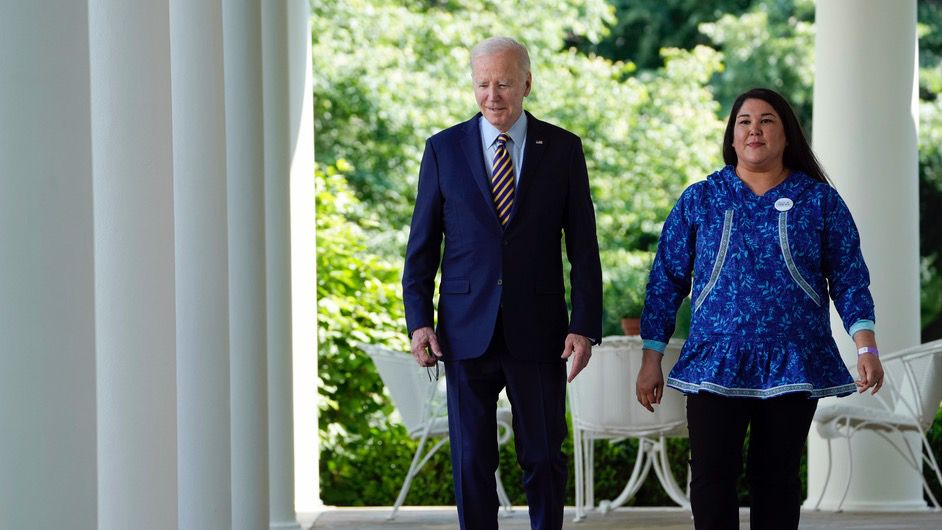On Thursday, the White House celebrated using a rarely invoked environmental law veto to prevent a proposed mining project from developing in Alaskan waterways and fish habitats, “some of the most pristine land on the planet,” President Joe Biden said.
“The amazing thing about resources like this is, if you take care of it, it can go on forever. It’s impossible to put an economic price on that,” Biden said. “And the opposite is true too: Once a resource like this is harmed or destroyed, it may be impossible to bring it back again.”
Biden was joined in the Rose Garden by Alannah Hurley, a Yup’ik native Alaskan commercial and subsistence salmon fisherwoman who leads the Untied Tribes of Bristol Bay. UTBB’s mission is to protect traditional native ways of life that depend on the Bristol Bay Watershed and the area’s wild salmon population.
“Salmon have sustained our indigenous ways of life and support thousands of American jobs. But for the last 20 years, the Pebble Mine has threatened to take all of that away — but our people stood up and fought back to protect what we hold sacred,” Hurley said. “Our people have been stewards of our lands and waters for millennia, and we must ensure that our region remains a safe haven to salmon, to clean water and to our native people forever.”
The Bristol Bay watershed produces nearly half of the world’s wild sockeye salmon harvest, provides at least 15,000 American jobs and has an economic value estimated to be worth more than $2 billion, according to a McKinley Research report prepared for the Bristol Bay Defense Fund.
The Pebble Mine, a gold and copper mine project, has been under study for nearly two decades, according to the Environmental Protection Agency. And in January, the agency used its veto power under the Clean Water Act’s Section 404(c), which allows the agency to veto a permit issued by the Army Corps of Engineers for dumping, dredging or filling material into the country’s waterways.
“After extensive review of scientific and technical research spanning two decades, and robust stakeholder engagement, EPA has determined that certain discharges associated with developing the Pebble deposit will have unacceptable adverse effects on certain salmon fishery areas in the Bristol Bay watershed,” the agency wrote.
The EPA most recently used it’s Section 404(c) authority in 2011. Including the Pebble Mine veto, it has only done so 14 times since the Clean Water Act was introduced.
“For many of you, this has been the fight of your lifetime. I’m sure along the way you were told this mine was inevitable, that you should just accept it, that you should give up. But you didn’t,” Biden said, adding that the bay is protected for future generations that depend on it — including the current ones, who are anticipating commercial salmon season in Bristol Bay.
“As one fisherman up there said, it’s like Christmas morning. They’ll head out on the water at dawn, cast their nets and fish the most bundent wild salmon on the planet,” Biden said. “Just like fisherman have done for generations, just like they will for generations to come, thanks to all of you.”



